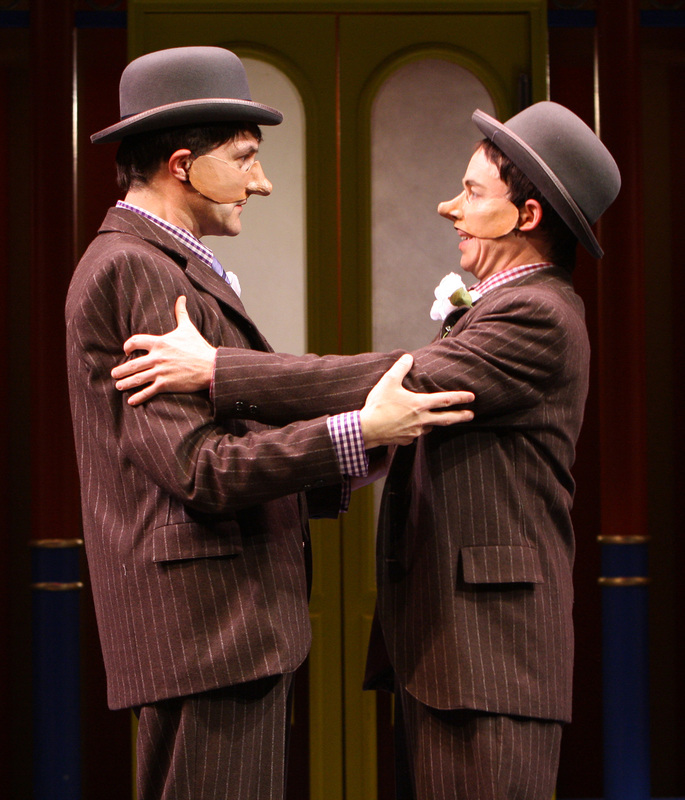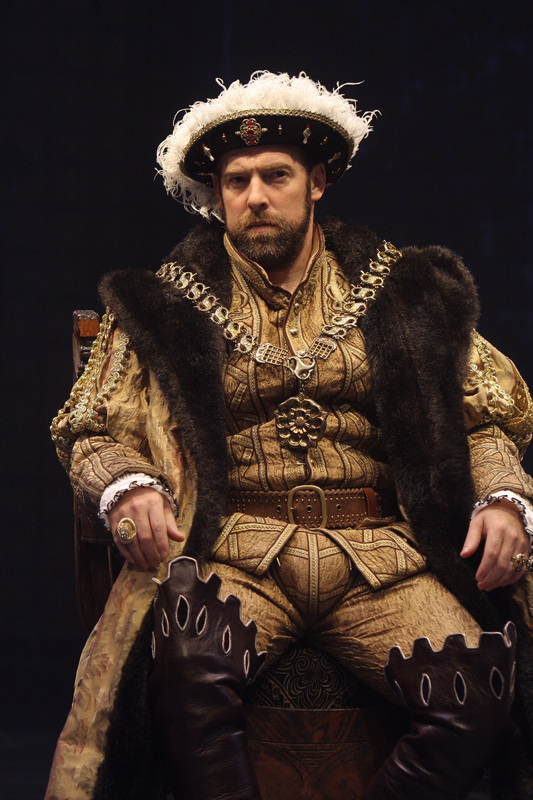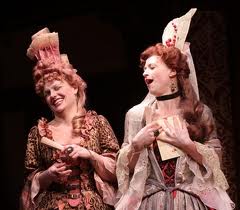|
JACQUELINE LAWTON: Why did you decide to get into theatre? Was there someone or a particular show that inspired you?
MICHELE OSHEROW: I always loved theatre and tried a variety of theatre jobs in my younger days: acting, designing, marketing—you name it—before heading to grad school for English lit. I think seeing Peter Shaffer’s Amadeus when I was a kid (YES, with Tim Curry and Ian McKellen) had me hooked for life. I also saw my first Shakespeare play at the Edinburgh Festival that same year so my brain was probably hard-wired to classics of some kind or another. JL: How do you define dramaturgy? Or explain to people the work that you do? MO: I still haven’t found a definition of dramaturgy that I swear by probably because the work so often depends on the specific project or the needs of a particular director, production team or cast. I’ll explain my work to folks by saying I’m “the scholar in the rehearsal room” (though that looks really pretentious)—someone who works on text and concept with the director and fields questions from artists and actors. I describe my aim to infuse a production with a kind of intellectual energy. I work largely on Shakespeare productions, so I think folks understand the link to scholarship. I also explain that once in the rehearsal room, I try to be a pair of eyes for the person who does not know the play: I attend to clarity of storyline, tracking plot, that sort of thing. It all has to make sense in the end. JL: How long have you lived and worked as a dramaturg in DC? What brought you here? Why have you stayed? MO: I came to the D.C. area for grad school a bazillion (22?) years ago. At that time one of my professors told me to “get serious about Shakespeare and stop doing theatre.” I tried that, but Shakespeare completely separated from theatre felt wrong and distinguishing between my literary studies from what I thought might occur on stage made less and less sense to me; I thought there had to be a way to merge professional theatre and scholarship. I started working at the Folger about 11 years ago—resident dramaturg for the last five years. JL: If your work as a dramaturg doesn’t pay the bills, what else do you do? How do you balance this work with your dramaturgy? MO: I’m an Associate Professor of English at UMBC (University of Maryland, Baltimore County). It’s a terrific institution for creative and scholarly research and has been very supportive of my theatre work. I take advantage of the ‘in’ and try and involve my students in Folger offerings as best I can. Balance? I sure haven’t found it—the guilt of not having written that next book is always there. I also have a fantastically generous husband who doesn’t sulk about my time at the theatre; my children do (though they love attending the productions and meeting the artists). JL: What skills and traits do you feel a successful dramaturg should have to support the development of a new play or a production? MO: I’ve only worked on a few new plays and it’s been thrilling; living playwrights are more exuberant than dead ones. I think the most important skills for a dramaturg on any project are an open mind and insatiable intellectual curiosity. And—this may sound strange coming from an academic--I think it’s helpful to know when to try to inspire feeling over thinking. JL: What is the greatest part of being a dramaturg? What has been your most difficult challenge? MO: There are too many great parts to name! I’m pretty wild about Shakespeare and seeing others respond to his work gives me a genuine thrill—corny, but so it goes. Making the humor work, making people feel something with the same language to which audiences responded hundreds of years back leaves me feeling very ‘connected’ to the human experience. And fostering human connection is one of the things theatre does so beautifully. And then there’s Shakespeare’s language: the poetry, the precision. It all works. To hear it time and again from the mouths of talented actors is one of those gifts I give myself. I love all the possibilities the plays hold, and while I know choices must be made for each production, I get inspired arguing points or choices with directors—challenging them. I don’t need to win those arguments (though it’s a mighty fine day when I do), I just want to recognize and, yes, celebrate the complexities that are in every play. I appreciate how many ‘rights’ there are with Shakespeare and how these stories still work to help us understand our world. Most difficult (and rewarding) challenge? That’s an easy one: Shakespeare’s Henry VIII, directed by Robert Richmond in fall, 2010. That’s a very difficult play. HUGELY difficult. The whole team wrestled with it and the result simply dazzled me. AND the run was extended! For H8! Incredible! JL: Who are your favorite playwrights? What is it about their work that inspires or draws you to them? MO: Well, sigh, Shakespeare’s my favorite. He just gets human nature (for better and worse) and is so good at showing us our secrets. I love the poetry and meta-theatricality with which he’s always playing. I must have read Hamlet 500 times by now and just when I think “this time I won’t see anything new”, Shakespeare always wins. The lesser-read/staged plays like Measure for Measure, Troilus and Cressida, and Cymbeline really attract me and have been a bit of an obsession in recent years. Shakespeare makes me think and feel—deeply and constantly. I am more than lucky that I’m able to engage professionally with these texts. Newer works: I like the rawness of Conor MacPherson and Neil LaBute. I love Suzan Lori Parks’s plays and the theatricality of them. I think Michael Hollinger is smart, watchful and funny and I’m a great fan of Anne Washburn as well—her revamped Orestes remains one of my favorite Folger projects. JL: DC audiences are ... MO: intelligent, generous, engaged. JL: DC actors, designers and directors are .. MO: wickedly smart, creative, thoughtful, fearless. JL: DC playwrights are … MO: becoming more and more celebrated, which is wonderful! JL: DC critics are ... MO: shrewd. JL: How do you feel the DC theatre community has addressed the issues of race and gender parity? How has this particular issue impacted you and your ability to get your work produced on the main stages? MO: I’m very aware of how few directors I’ve worked with are women and/or people of color—there have been some, but not many. It’s a better picture in terms of the pool of designers and actors. I will hear from friends and patrons when there’s a cast without a person of color or very few women’s names listed on a production team. JL: What advice do you have for an up and coming DC based dramaturg who has just moved to D.C.? MO: See a lot of theatre; speak to the great folks behind D.C. theatres and get involved with the projects you’re keen to work on… I’ve had students who’ve volunteered their services to get their feet in theatre doors and it has worked. (But don’t quit your day job just yet.) JL: What's next for you? Where can we keep up with your work? MO: We've just closed Henry 5- and are currently rehearsing Twelfth Night. Next season has just been announced and I'm very excited about it-- we've already begun the work!
0 Comments
Your comment will be posted after it is approved.
Leave a Reply. |
My BlogI'm a playwright, dramaturg, and teaching artist. It is here where you'll find my queries and musings on life, theater and the world. My posts advocate for diversity, inclusion, and equity in the American Theatre and updates on my own work. Please enjoy!
Categories
All
Archives
June 2020
Reading List
|



